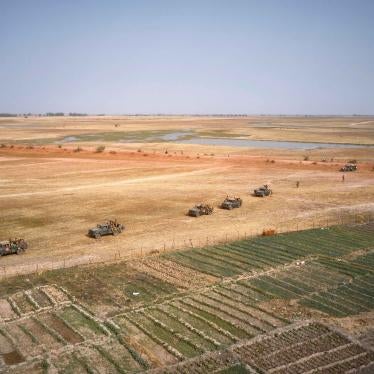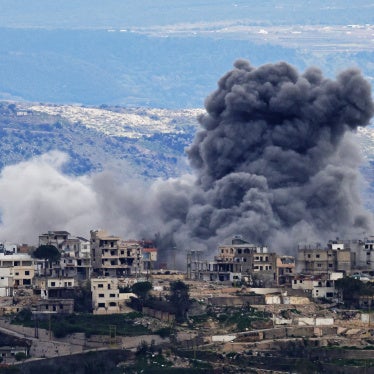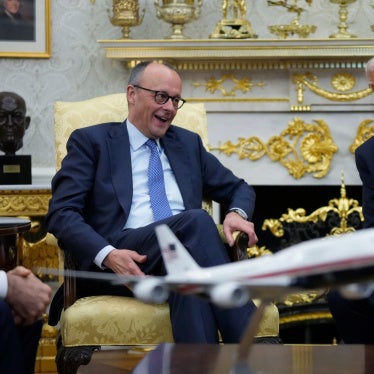His Excellency Ibrahim Boubacar Keita
President
Bamako
Republic of Mali
March 17, 2014
Re: Ending Impunity for Grave Human Rights Abuses
Your Excellency:
We write to you today on behalf of Human Rights Watch to urge you and your government to make meaningful progress in ensuring justice for the victims of serious rights abuses perpetrated by all sides during Mali’s recent armed conflict.
Human Rights Watch is an independent international organization that monitors and reports on human rights in some 90 countries around the world. During seven research missions to Mali in 2012 and 2013, Human Rights Watch researchers documented hundreds of abuses, including extrajudicial killings, torture and sexual violence, among other crimes.
We fully recognize the many pressing challenges you inherited upon taking office in September 2013 and welcome the commitments you and your minister of justice, Maître Mohamed Ali Bathily, have made to ensure those responsible for serious crimes are held accountable.
We are encouraged by progress towards ending impunity made by the national judiciary, notably the courageous and independent work of those investigating the 2012 enforced disappearances and torture of at least 21 soldiers, primarily elite Red Berets, by men loyal to coup leader Amadou Haya Sanogo. A few other cases are also being investigated including the 2012 alleged rape by gendarmes of a child in Mopti, and the May 2013 killing of two Tuareg men in Gossi by members of a pro-government militia.
We are also encouraged by your government’s continued cooperation with the prosecutor of the International Criminal Court, which opened an investigation in January 2013 into alleged crimes committed since January 2012. The prosecutor has so far given particular attention to crimes in the north, including the execution of Malian soldiers in Aguelhok and targeting of religious and cultural shrines.
However, numerous other victims of abuses by all warring factions during Mali’s recent armed conflict await justice. Progress by national authorities on the “Red Beret” case should be the first of many cases investigated with impartiality and professionalism and should mark the beginning of wider accountability efforts. Ensuring accountability for abuses by all sides is hugely important not only for the families of the victims but also for the hope it represents in breaking the cycle of violence, fear, and impunity that has blighted the lives and hopes of Malians for many years.
Serious Abuses by all Factions
Human Rights Watch and other international and national organizations extensively documented war crimes and other serious abuses committed by all sides during Mali’s recent armed conflict. These abuses include the summary execution of up to 153 Malian soldiers in Aguelhok by armed groups who occupied the north; widespread looting and pillage, and sexual violence by the Tuareg National Movement for the Liberation of Azawad (MNLA); and the recruitment and use of child combatants, executions, floggings, amputations, and destruction of shrines by Islamist armed groups. Malian soldiers were also implicated in serious abuses, notably during the 2013 offensive to take back the north, including 26 extrajudicial executions, 11 enforced disappearances, and over 70 cases of torture or ill-treatment of suspected Islamist rebels and alleged collaborators documented by Human Rights Watch.
Mr. Bathily, in an October 2013 meeting with Human Rights Watch, expressed his commitment to investigate alleged crimes by all sides but said that investigations are severely hindered by the absence of judicial authorities including investigative judges, prosecutors, and judicial police, who were forced in early 2012 to flee the northern regions of Gao, Timbuktu, and Kidal. We recognize this as a significant challenge and in this regard welcome the return in early 2014 to Gao and Timbuktu of some judicial authorities.
However, we are concerned about the lack of progress in investigating the many crimes committed within areas in which the judicial authorities never left, including in Konna, Sévaré, and Mopti. Furthermore, in November 2012, the Supreme Court decided to permit a Bamako court to hear criminal cases from the three northern provinces – and in doing so created a path to accountability for serious crimes committed in the north – yet little progress has been made despite the fact that many victims and witnesses to serious crimes in the north fled to and now reside in Bamako.
Families Await Justice
In recent months, Human Rights Watch has spoken with numerous families of victims who have tried to ensure justice for the loss or injury of their loved ones, as well as local lawyers who are representing victims of abuses in their pursuit of justice. To date over 30 families have filed complaints and missing persons’ reports with the police and gendarmerie and written letters to prosecutors detailing crimes. Many of these victims and families are being accompanied in their pursuit of justice by the Malian Association of Human Rights, International Federation for Human Rights, and Malian Association of Jurists.
Unfortunately, almost none of their cases have been investigated, and none of those allegedly responsible brought to justice. Furthermore, few of the many crimes by all sides exposed by human rights groups, and Malian and international journalists, have yet to be the subject of an investigation.
Even when investigations are opened, progress toward justice is often blocked. Judicial authorities have told Human Rights Watch how their requests to gendarmes to investigate certain crimes related to the conflict have been ignored. In other cases, investigations undertaken by gendarmes – notably in Gossi and Gao – were never pursued by the judiciary.
Several of the cases for which family members anxiously await an investigation and justice include:
• Serious crimes by Malian soldiers in Sévaré and Konna: In January 2013, at least 13 men accused of supporting Islamist armed groups were summarily executed and another five forcibly disappeared by government soldiers based in Sévaré and in Konna. Many of the victims were executed in broad daylight near the Sévaré army base or in an empty lot near the bus station. The bodies of several victims were dumped into one of four wells on the empty lot. In January 2013, Human Rights Watch saw clear traces of blood in and around each well; in one well at least three bodies were visible. An investigation has yet to be opened, despite the public nature and physical evidence of these crimes; the fact that the crimes were widely reported by human rights groups and journalists; formal requests by a prosecutor to gendarmes to investigate the crimes; and civil complaints by family members of at least nine of the victims to both the gendarmerie and prosecutor’s office in Mopti.
• Execution of Malian soldiers by Islamist armed groups in Konna: In early January 2013, Islamist rebels who attacked and briefly held Konna summarily executed at least seven Malian soldiers after the soldiers either ran out of ammunition or were wounded in combat, witnesses told Human Rights Watch.
• Victims of sexual violence by the MNLA and Islamist armed groups in Gao region: Credible reporting by local women’s groups and international rights groups, including Human Rights Watch, suggests that at least 50 girls and women were subjected to sexual abuse including rape, gang rape, sexual slavery and forced marriage during 2012. The vast majority of these abuses occurred in the Gao and Timbuktu regions, and were allegedly perpetrated by the MNLA and Islamist armed groups occupying the north. While over a dozen victims have courageously filed a complaint with the authorities, no one has been arrested or prosecuted for these crimes.
• Enforced disappearance of Mahmoud Ag Hattabo in Bamako: Witnesses and family members told Human Rights Watch that Ag Hattabo, 46, the former council president of Ansongo (président du conseil de cercle d’Ansongo), was seen leaving the Hotel Naboun in the Magnambougou neighborhood of Bamako at around 11 p.m. on September 18, 2012 in the presence of several armed men. His family promptly reported him missing to the gendarmerie, but an investigation into his disappearance has yet to be opened. Family members said he was seen in the weeks after his disappearance within both the Kati military barracks and the Headquarters of the State Security.
• Enforced disappearance of five men by Malian soldiers in Timbuktu: Relatives and neighbors told Human Rights Watch that on February 14, 2013, Malian soldiers detained four Arab and one Songhai men in the Abaradjou neighborhood of Timbuktu. They have been missing ever since and are feared dead. The government has on two occasions pledged to hold those responsible to account, first in February 2013, when six soldiers were briefly detained in connection with the crime, and in December 2013, following the publication of an article by the Associated Press that described the grave of two of the men. However, family members and a lawyer for one family told Human Rights Watch in March 2014 that an investigation by the Malian judiciary has yet to be opened. The “disappeared” men are Ali Ould Mohamed Kobad, 65; Danna Ould Dahama, 38; Mohamaed Ould Dahama, 40; Maouloud Fassoukoye, 40; and Mohamed Oud Sidi Ali, 68.
• Amputation and mutilation by Islamist armed groups in Gao and Timbuktu regions: During their occupation of the north, Islamist armed groups amputated the limbs of at least 12 men in Ansongo, Gao and Timbuktu. Several of the victims fled to Bamako where they received medical treatment.
• Torture and ill-treatment of suspected Islamist rebels and supporters: Human Rights Watch interviewed more than 150 men in detention who were accused of supporting armed groups in the north. The majority of these alleged being mistreated by Malian soldiers in the north; in several dozen cases, the mistreatment amounted to torture. They described being severely beaten, kicked, and choked; burned with cigarettes, lighters and candles; injected or forced to swallow a caustic substance; subjected to simulated drowning akin to “waterboarding”; having their head slammed against walls and cars; and, in a few cases, subjected to apparent electric shocks. Five described being beaten until unconscious; two said they suffered broken ribs; one victim went blind in one eye after being clubbed in the face with a gun butt; and another suffered partial hearing loss after being kicked repeatedly in the head. Several described vomiting blood. Some 30 detainees described soldiers robbing them of money, cellphones, merchandise, jewelry, and animals. The abuses stopped once the men were handed over by the soldiers to the gendarmes, who usually provided medical care for those mistreated. Despite ample evidence of widespread abuses, the gendarmes have failed to initiate investigations into those responsible for torture and other ill-treatment of detainees.
Accountability and Challenges Facing the Judiciary
The lack of progress in ensuring justice for the aforementioned abuses and many other serious crimes committed during the armed conflict is worrying. We are also concerned about provisions in the June 18, 2013 Ouagadougou Accord that create ambiguity as to whether those responsible for serious crimes will be appropriately prosecuted.
We are concerned that decisions to release at least 35 people associated with warring factions and the lifting of arrest warrants in October 2013 against four others as “confidence building measures” were carried out without regard to whether they might have been responsible for serious international crimes. Prosecutions for past serious offenses are crucial to deter crimes in the future, and so that the victims and their families – and Malian society as a whole – see justice done.
We recognize the many challenges faced by the Malian judiciary, including insufficient prosecutors, public defenders, and clerks; and severe logistical constraints, including insufficient computers, photocopiers, and vehicles to transport prisoners and witnesses to court. These are compounded by the ongoing insecurity in the north, where the majority of abuses during the recent armed conflict occurred. Judicial personnel interviewed by Human Rights Watch have expressed fears about not only the generalized climate of insecurity due the continuing presence of armed groups in the north, but also the potential for being targeted by those under investigation.
However, these challenges should not be used to justify inaction. There are number of steps that your government should take in accordance with its obligations under international law to provide justice for serious crimes. For instance, investigating judges and gendarmes can move the aforementioned and other cases along by interviewing witnesses, building dossiers, and collecting forensic evidence, especially for those crimes committed in the south and victims who are now living in the south. More broadly, efforts in these specific cases could potentially help to catalyze longer term efforts aimed at strengthening the justice system. We therefore urge you and your government in the coming weeks and months to give priority to justice for victims of serious crimes during the armed conflict and:
1) Develop a comprehensive and public strategy to ensure the prompt investigation and appropriate prosecution of those from all sides of Mali’s recent armed conflict responsible for serious violations of international human rights and humanitarian law.
2) Provide sufficient resources, including from international donors, to address the deficiencies in the criminal justice system, to ensure victims’ access to justice and the right of accused to a fair trial.
3) Ensure that all accused have access to defense counsel and without payment if indigent.
4) Ensure adequate security for judicial personnel operating in areas of insecurity or handling cases involving serious human rights abuses.
5) Publicly clarify that the provisions of the Ouagadougou Accord do not provide immunity for serious international crimes committed during the armed conflict. Oppose any amnesty for serious crimes in any future negotiated settlement among the warring factions.
Upon taking office in September 2013, you cited national reconciliation and addressing impunity as your most pressing priorities. Human Rights Watch firmly believes that one of the best means to achieve these ends is to ensure fair, credible, independent and impartial investigations and trials for crimes committed by all sides. The victims and their families deserve nothing less. The failure to ensure justice too often undermines efforts to develop democratic institutions, the rule of law, and respect for human rights. Please contact us if we can be of assistance in assisting your government in achieving these aims.
Sincerely,
Ken Roth Babatunde Olugboji Corinne Dufka
Executive Director Deputy Program Director Senior Researcher
Human Rights Watch Human Rights Watch Human Rights Watch







